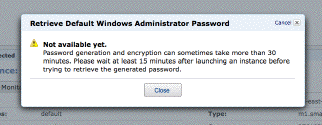
 Amazon EC2 sucks at launching Windows instances
Amazon EC2 sucks at launching Windows instances 
A few weeks ago I posted a note here about how it was taking over 24 hours for Amazon to launch an EC2 instance. Then for a while it seemed to get better. Now it's sucking again.
I had developed a bit of voodoo. Instead of launching one instance, I'd launch two. Usually one of the two would be ready to go within an hour. But today I've launched eight instances, starting first thing this morning, and none of them have gotten to the point where they would return a Windows password. This coming from an AMI that I was able to launch yesterday just fine.
I write these notes because I don't know what else to do. I'm sitting here at zero productivity, waiting and waiting. I love EC2. But this is ridiculous. It's like the parrot in the Monty Python sketch. Beatiful plumage. Pushing up daisies. ![]()
Update: The next pair of instances I launched came up right away, as I suspected they might.
 My Twitter/OAuth code stopped working last night
My Twitter/OAuth code stopped working last night 
 First let me say it could well be, probably is, something I did wrong that led to my Twitter/OAuth code to stop working overnight.
First let me say it could well be, probably is, something I did wrong that led to my Twitter/OAuth code to stop working overnight.
I first noticed it a few minutes ago when I posted something to my feed that didn't go through. I checked the database to see what went wrong. It said, "Incorrect signature."
So the first question -- is anyone aware of anything that changed in the Twitter API last night?
Second question -- I'm new to using Twitter's OAuth interface. Is it realiable or flaky or somewhere inbetween?
 I don't think it could be a terms-of-service thing because my app is doing exactly the same thing as TwitterFeed, and as far as I know they're still legal. I was using TwitterFeed until a couple of weeks ago, but needed an interface with less latency.
I don't think it could be a terms-of-service thing because my app is doing exactly the same thing as TwitterFeed, and as far as I know they're still legal. I was using TwitterFeed until a couple of weeks ago, but needed an interface with less latency.
Update: When I posted a link to this item to my feed it got through to Twitter. Now I'm truly puzzled! ![]()
Update #2: They're seeing the same thing at the Chicago Tribune.
 11 free hackathon ideas
11 free hackathon ideas 
 Academic hackathons are the rage, and there's one coming up this weekend at NYU.
Academic hackathons are the rage, and there's one coming up this weekend at NYU.
Unfortunately, imho of course, the commercial APIs are over-represented and open formats and protocols are not represented at all. RSS will never offer you a job or fund your startup, but -- it might keep the Internet free so we'll still be interested in entrepreneurship for the Class of 2020 and beyond. You always have to keep putting back. And as the Twitter developers will tell you, the waters that surround big battleships and aircraft carriers can be very turbulent. As they say, when an 800-pound gorilla sneezes, you're the one with boogers all over you. ![]()
That's why I like platforms without platform vendors. There's no one to change the rules, decide that you've been copying them when they've been copying you. To deprecate the APIs that you've invested your life savings in.
Okay anyway, enough motivation.
The 11 free ideas are:
1. Share Your OPML.
2. Beautiful River.
3. UI for FeedHose.
4. Centralized subscription manager.
5. Hack status.net so we can template it.
6. What if Readability and Instapaper didn't have to scrape?
7. REST interface for DNS.
8. Open source Dropbox clone.
9. Drop-dead simple static hosting.
10. University news.
11. Make Apache an end-user product.
All are explained in more depth in two bits I wrote last fall.
1. Seven free project ideas for an academic hackathon.
2. Four more free ideas for your next hackathon.
Now, if you're interested in doing one of these projects at this weekend's hackathon at NYU, post a comment here. I live a few blocks away so I can help you, and I will, with any of these projects.
The cool thing about them, is that they all make the Internet better and more useful and more open, and they are open-ended. They aren't done when the weekend is over. Because -- they're useful. ![]()




